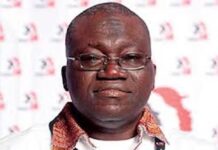By Chimezie Godfrey
The Minister of Defense, Bashir Magashi has said that the roles of religious and traditional institutions cannot be downplayed in adopting Non-Kinetic Approach to insecurity.
Magashi said this during a policy engagement by the National Orientation Agency (NOA) in Abuja on Tuesday, themed: ‘A Stakeholders Conversation on the Recommendations From the National Summit on Non-Kinetic Response to Insecurity’.
The Minister who was represented by the Director Army Affairs, Mr Attah Musa noted that the engagement came at the right time considering the spate of insecurity despite visible efforts of the military and other security agencies.
He however stressed the importance of religious and traditional institutions in curbing insecurity through Non-Kinetic Approach since their roles include cultural values, beliefs and others.
He said, “The engagement couldn’t have come at a better time than now when our beloved country is witnessing insecurity and threats to life and properties in spite of the increasing visibility of combat engagement of the Nigerian military and other security agencies in the management of internal security.
“Arising from this, many stakeholders and security experts are suggesting the use of Non-Kinetic Approach as a plausible mechanism that can be adopted in the resolution of security challenges currently bedevilling our country.
“However, in adopting this strategy, the role of traditional rulers and religious institutions in conflict management resolution as well as the maintenance of peace and security cannot be downplayed. Their roles are critical to national cohesion and stability as the approach involves cultures, tradition, values and beliefs.”
He therefore commended the NOA and other stakeholders for the efforts in reducing insecurity to the barest minimum through the recommendation of Non-Kinetic Approach.
Earlier in his remark, the Director General of the NOA Dr Garba Abari in his opening remark stated that the engagement was a follow-up to a 2-Day Summit initiated by the NOA and the Defense Intelligence Agency (DIA) in December 2021, to discuss non-kinetic approach to dealing with insecurity in Nigeria through collaborative synergies.
Dr Abari said that the inputs from the summit culminated in the drafting of the National Narratives that integrate all efforts in a manner that delivers Non-Kinetic Response to varied security challenges to complement Kinetic response and prevent the occurrence of security britches while acting on early warning products.
He further stated that the engagement is aimed at starting a conversation to yield ideas that will add value to the recommendations produced at the summit.
He said, “The Summit identified key issues; produced policy priorities, policy issues, recommendations and multi-stakeholder approaches for communities, the Army, Non-state actors, Religious and Community Leaders, NGOs, Federal and State Governments.
“Today, we are here to explore areas of synergy, aimed at deploying effective non-kinetic strategies to insecurity in Nigeria. This is the reason why we are gathered here today.
“The aim is to instigate conversation that will produce ideas that will add value to the recommendations produced at the National Summit and together with you; our stakeholders, design strategies for implementation of the recommendation and the policy issues in a collaborative and partnership synergy.”
He further identified some of the recommendations from the earlier summit as follows:
“TO NIGERIAN GOVERNMENT; Intensify kinetic approach, and if possible, engage the direct military intervention of foreign actors to contain insurgency and banditry in the north.
“Non-kinetic approach should be made to reach the target groups in the rural communities. Corruption in the execution of material components of non-kinetic approach should be eradicated.
“Explore negotiations and political solutions to some of the case studies such as separatist agitations and those elements of insurgents genuinely willing to make peace. Get the military to abide by their rules of engagement, strengthen relationships with communities and obey citizens’ rights.
“To CSOs and other development partners; Support peace initiatives for conflict de-escalations in all regions, locating influencers and helping to build trust.
“Pressure and support the government to adequately invest in peace infrastructure and preventive initiatives.
“To State Government; Support local community peace building initiatives, identify and recommend local influencers to the national government.
“Invest in community development projects and campaign against violence responses to conflicts. Engage local religious leaders and traditional leaders to help shape opinions on emerging conflictual issues”
Also speaking, the Chief of Defence Intelligence, Maj Gen Samuel Adebayo represented by Miss Yetunde Olobayo noted that contemporary threats to national security and activities of non-state actors ranging from terrorism, banditry, kidnapping, and electoral violence as well as cybercrime, among others, have gone beyond traditional threats to become more complex and multidimensional.
He therefore hammered the importance of collectively fostering capable and responsive mechanisms that support and strengthen national security as the 2023 elections draw closer.
“This has raised the need for enhanced synergy between DIA and NOA and underscores the need for increased inter-agency and multi stakeholder collaboration and partnerships to evolve non-kinetic solutions towards addressing ever-changing national threats.
“As the 2023 general elections are approaching, the NOA, DIA, all agencies of government, stakeholders and Nigerians have key roles in reducing election-related conflict dynamics while promoting peaceful conduct, ” he said.
Similarly, the President of the ECOWAS Commission, Dr Omar Alieu who was represented by Dr Aderemi Ajibewa said, “We’ve been working with some of the partners and also we have the Anti Terrorism strategy as ECOWAS which shall be implemented and we are on the action plan for 2021 to 2024 in which we involved quite a lot of stakeholders.
“The Focus has earlier been on the military perspective, but at ECOWAS we believe that there are the non-military areas that we need to focus on. In the ECOWAS action plan, we have the third line of action which we call the ‘Community Mediation Process’.
“We believe that it is time now to have communal policing and as well involve the civilians, traditional and religious leaders.”
He therefore reiterated that ECOWAS will continue to support NOA on the process.
Adding his voice, the Director General of National Intelligence Agency (NIA) Ambassador Ahmed Abubakar, represented by Mike Okwudili, said government and society approach is what Nigeria needs for success to be achieved because the Non-Kinetic Approach brings everyone together.
He also stressed the need for Inter-Agency collaboration as well as determination and clarity of purpose on the part of those at the forefront of fighting insecurity, while expressing commitment and solidarity with the NOA.
“It is important that we underscore the importance of interagency collaboration; it is extremely important because that is what the terrorists seem to be doing better adding terrorists across all countries fighting insurgency share information and exchange training adding that the terrorists should not do better.
“Non-Kinetic Approach is about hearts and minds because when you see a man fighting, he doesn’t just fight, he fights with his heart; determination is key to what we can achieve, ” he said.
Also represented at the stakeholders’ engagement were the Chief of Army Staff, Chief of Naval Staff, Chief of Air Staff, DG of Nigerian Communications Commission, CG of Nigeria Security and Civil Defence Corps, President of CAN, National Security Adviser, and European Union, among others.




